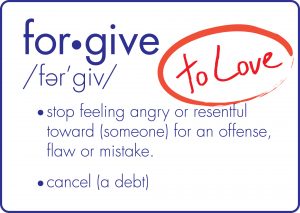One More Year of Choices
By Barbara Dahlgren
 Having been born in the foothills of the Ozarks, I know a bit about grudge mentalities. Now don’t get me wrong! I love my roots, but mountain and hill people have a reputation for holding a grudge. Of course, so did the Godfather, but I’m not from Sicily. Grudges can last forever – long after those who felt mistreated are dead and buried. Yet the hatred against one family or another lives on. The Hatfields and McCoys fought so long that no one remembered what the original argument was about. Nothing good comes from holding a grudge. People become bitter and resentful.
Having been born in the foothills of the Ozarks, I know a bit about grudge mentalities. Now don’t get me wrong! I love my roots, but mountain and hill people have a reputation for holding a grudge. Of course, so did the Godfather, but I’m not from Sicily. Grudges can last forever – long after those who felt mistreated are dead and buried. Yet the hatred against one family or another lives on. The Hatfields and McCoys fought so long that no one remembered what the original argument was about. Nothing good comes from holding a grudge. People become bitter and resentful.
When we think we’ve been wronged or treated unfairly, we become resentful. Resentment is defined as bitter indignation. The Bible has nothing good to say about being bitter and resentful. In fact, it says be careful not to let a root of bitterness spring up and cause trouble. (Hebrews 12:15) If it does spring up, we are instructed to put it away. (Ephesians 4:31)
Here’s how resentment and bitterness can start. We get deeply hurt. We feel injured or offended. We justify these feelings. We think we have a right to feel this way. Then the person who did these awful things to us does not react the way we think they should. They don’t apologize. They don’t grovel. They may even ignore us. We say things to ourselves like, “If only they would acknowledge what they did to me, I could let go of this bitterness.” But they don’t acknowledge it. Maybe they don’t even care!
So we decide to turn it over to God. After all, God tells us not to take revenge, because vengeance is His. (Romans 12:19) We’ll leave their punishment in God’s hands. They better watch out because now they are going to get it! But what happens? God doesn’t punish them the way we think He should. They may even prosper. Maybe God won’t punish them at all. We feel like God has really botched this, because we want them to suffer the way they made us suffer.
What are we supposed to do for those no good, lousy rats who wrong us? Well…we are supposed to do the right thing, even when they don’t. God says not to repay evil with evil. (Romans 12:17) We are to pray for our enemies. We are to bless our enemies. (Matthew 5:44) We are to trust God to take care of it – His way. We need to forgive them, even when they don’t ask for forgiveness or acknowledge what they’ve done. We are to let go of bitterness and resentment because no good can come from it. It breeds anger and discontent, which will not enhance our spiritual growth or journey.
Consider this… Resentment and bitterness do not hurt the other guy as much as they hurt us. Nelson Mandela puts it this way: “Resentment is like drinking poison and hoping it will kill your enemies.”

Suggestions for practicing this choice…
Ask God to help you let go of bitterness and resentment because they will hinder your spiritual growth. It hardens your heart. We become unreceptive to God’s Word and love. We get stuck in the past, unable to move forward.
We are to forgive our enemies. Forgiveness does not mean letting others continue to hurt us. It just means we surrender our right to get even or retaliate.
When we pray for our enemies or ask God to bless them, we are asking God to do what is best for them. We think “best” means showering someone with health and wealth, but God doesn’t think the way we do. We aren’t asking God to buy them a Mercedes Benz. God knows what they need to be a better person; we do not.
Do what’s right even if the other guy doesn’t. We are told that if our enemies hunger or thirst, then give them food and water. (Romans 12:17-21) Overcome evil with good.
Remember, no matter how long we nurse a grudge, it will only get bitter, not better.


